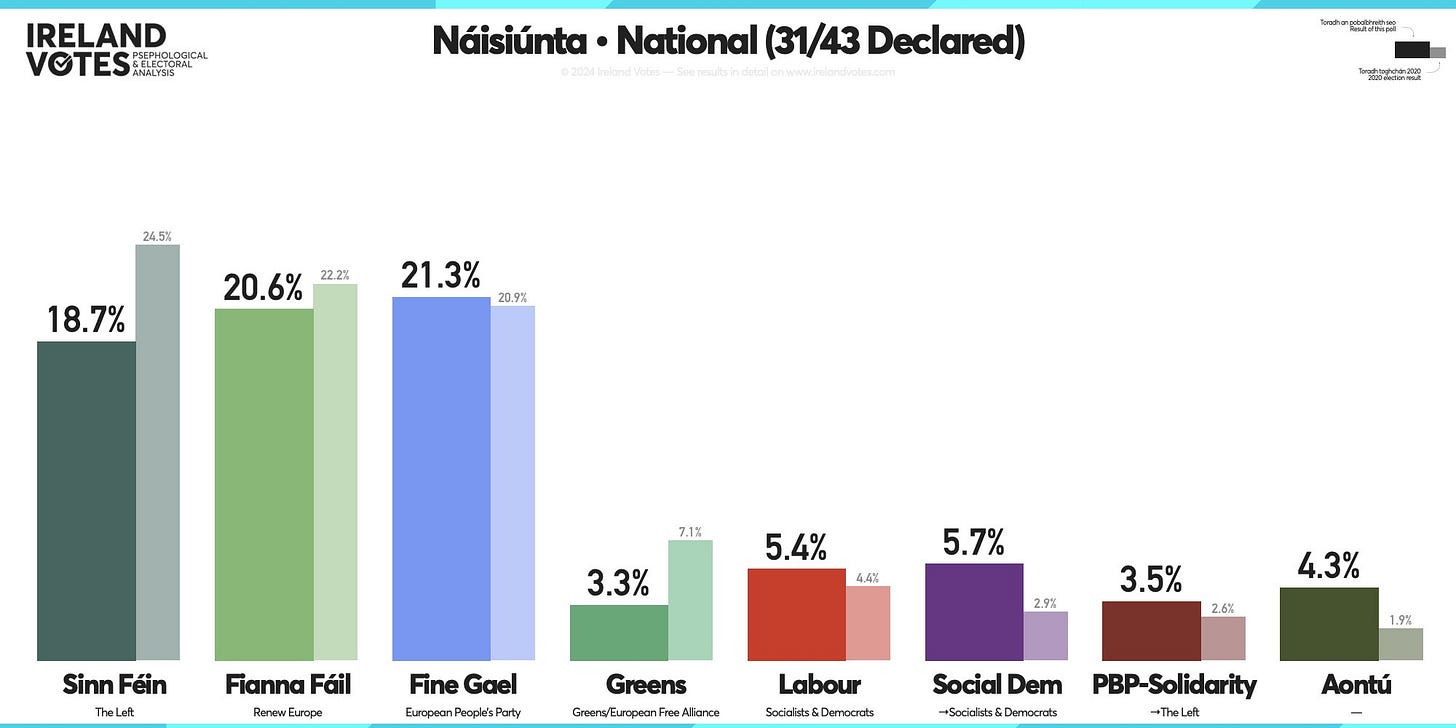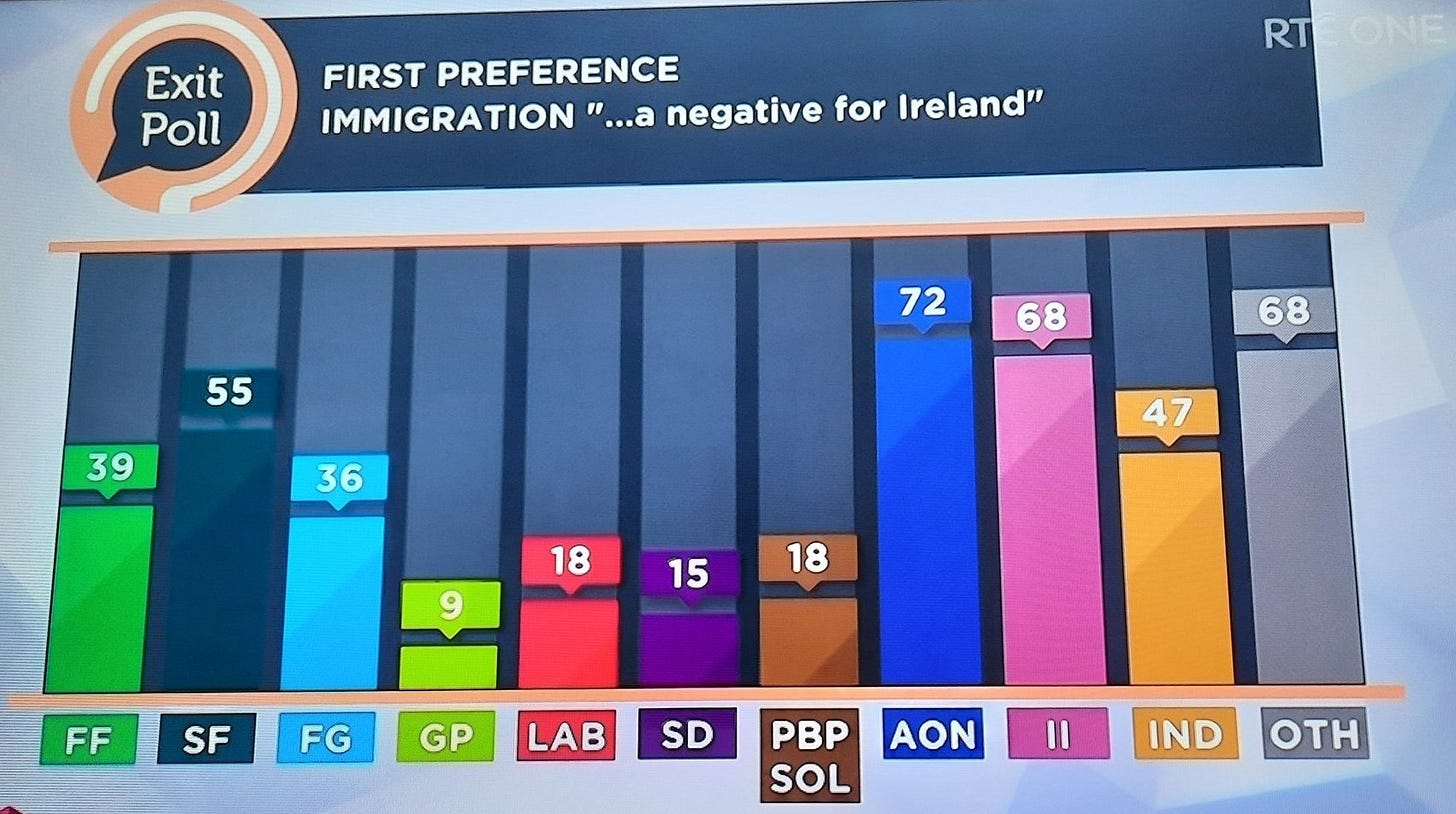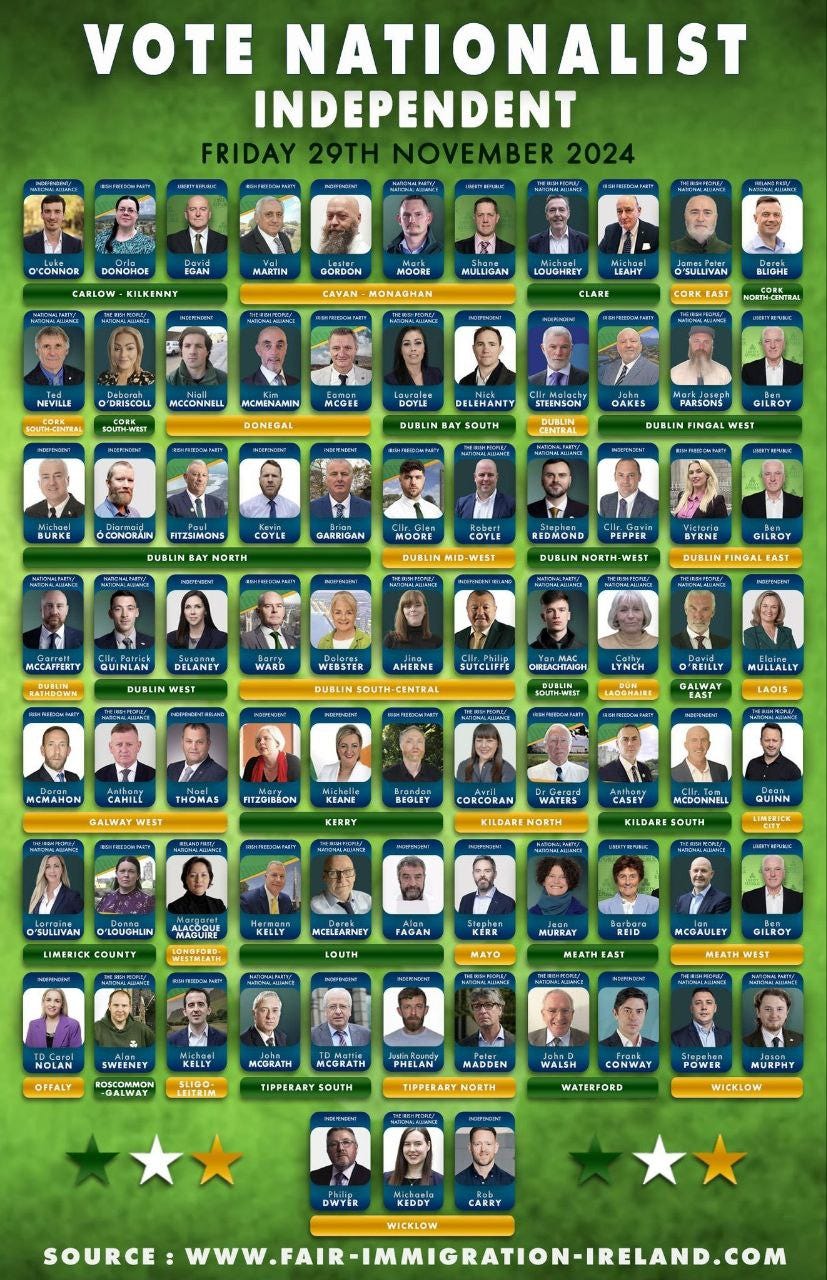Today was the day counting began in Ireland’s general election. There isn’t much positive to say about it from a nationalist perspective. I don’t really have a big thesis here and the votes are still being counted, but I’ll write a bit of a stream of consciousness on my thoughts.
Nationalists will not win any seats, and the establishment parties have been returned to power. Insofar as they lost support, it went to more to left-wing alternatives like the Social Democrats than anything on the right. The share of votes to nationalists did increase, and some had very respectable outings. Malachy Steenson, the organiser of the highly publicised East Wall says no protests would almost certainly have won a seat if not for the late inclusion of celebrity candidate Gerry “the monk” Hutch, a famous (alleged) career criminal in Ireland who voters apparently thought would make a great avatar of populist discontent.
The mood of Irish nationalists is some mix of despair and bemusement, how are people still voting for these parties? Taking one example, our minister for justice Helen McEntee who topped the poll in her consituency, I wrote:
Is there a better example of what a poor test of ability the electoral system is?
Helen McEntee was objectively one of the worst ministers in the history of the Irish state. As Minister for Justice, her pet project for years was the woeful Hate Speech bill, which became so unpopular the government had to scrap it.
She presided over a huge breakdown in law and order in Irish cities and the chaos of the Dublin riots; an explosion of fake asylum seekers entering the country to abuse the system; massive over the top police responses to community protests against refugee centers.
Despite it all, she now tops the poll in her constituency – a seat she only got in the first place because her father who previously held it took his life and voters gave her the seat in a bi-election – and has been promoted to deputy leader of her party, meaning there's a decent chance she may one day lead this country.
A good portion of these voters likely vote for her because they liked her father, another portion because they think it will be "good for the area" to be represented by a government minister, and then a large chunk of boomers who will just back the status quo no matter what for "stability".
What other system would reward someone so unremarkable so generously?
Ireland could probably be studied for an ideal case of keeping liberal pluralism stable. After all the years of unrest over immigration, now at one of the highest rates in the world, highly publicised migrant crimes, deeply unpopular hate speech laws, shocking examples of waste and misallocation of resources, there has been no discernible response from the electorate.
Perhaps the most baffling thing about Irish politics is how many people say they view mass-immigration as a big problem and vote for the parties responsible for it anyway.
According to this poll, over half of Sinn Féin supporters said immigration is a “negative for Ireland”. A poll after this year’s local elections that showed 22% — almost a quarter of the electorate — believed that “the establishment is replacing white people with non-white immigrants and that elected officials want more immigration to bring in “obedient voters”. Even more promising, 72% thought the government had lost control of immigration, and there should be “very strict” limits on immigration. Yet neither then, nor today, did this translate to a big vote for anti-immigration candidates. And that is the great frustration with the Irish electorate, seemingly always flattering to deceive.
No doubt, a lot of people that vote for the established centrist parties of Fine Gael and Fianna Fáil do so because, although they may have concerns about hate speech, wokeness or immigration, they look at the electoral opposition and see a hodge podge of far-left alternatives like the Green Party, the Social Democrats and People Before Profit.
Of course, the dominant force in the electorate is still Boomers, and they still vote in the majority for Fine Gael and Fianna Fáil, and will do so to their graves, regardless of what they do. If they don’t do this out of personal loyalty to a candidate, it’s because they value “stability”. Never mind their grandkids being unable to afford a home or being replaced with foreigners, the pensions are paid on time and almost everyone has a job. Still, it’s hard for me to hate on the boomers too much for this. Objectively, they are less left-wing than younger voters. A good part of the reason they are so loyal to the establishment center is the only alternative you see on television is the hard left, and they’re unlikely to take an upstart party seriously that doesn’t get a mainstream television or radio platform.
The End Of Ireland's Great Consensus
Last Monday, May 6th, Irish people gathered in Dublin for a protest against the government’s immigration policy. This was the second Bank Holiday Monday in a row where an event like this happened, but this crowd was the biggest yet, reaching many thousands of people.
No, the more depressing trend is how left-wing younger voters are. Of course, that’s true across Europe, but in most other European countries there is a decent share of young people supporting an identitarian alternative. Not so in Ireland. This could change, but it’s clear that any nationalist movement is going to have to be much more professionally presented. And here, I will point the finger at boomers.
Being against multiracialism is extremely taboo today, and so it’s not going to be ordinary people opposing it publicly. There are really two types that will, and that is ideologues who tend to be a bit more autistic than the general population, and are more represented among younger nationalists, and then there are cranks. Cranks are the natural base of the populist right. Cranks are schizos, who see almost everything as part of a conspiracy by “the elite”, and forego any kind of structural analysis to understand the world. They are irrationally opposed to all change, and come up with half-baked explanations for why everything from 5G to the polio vaccine is bad. Since they oppose all change, they also oppose mass-immigration. Boomers and Gen Xers are overrepresented among cranks. They obsess over internationalist organisations like the WEF, the WHO and the UN, often with conspiracies about how one of them is secretly controlling the puppet strings behind all governments. They love creating petitions, commissions, promising Nuremberg trials for treacherous elites, and finding loopholes in the constitution that proves the government is illegitimate. They are electoral poison, not just in Ireland but everywhere in Europe, but they make a lot of noise online. After the election results, many of the cranks rushed to invent their own version of stop the steal and allege election rigging without a shred of evidence.
Another thing about cranks, especially boomers, is they never have a realistic sense of what’s feasible politically. This is why in many constituencies you had multiple nationalist candidates running. Just take a look at this map, did Dublin Bay North really need five candidates running? Was there none that could find another one of the candidates to support?
Very few of these people take a serious look at the trends and what is likely, in which case they would realise more than one nationalist candidate in a constituency does nothing but split votes. Each time, they convince themselves the people are ready to “wake up”, even for a campaign with no professionalism, strategy or team to canvass. A lot of this is just ego. Most boomers refuse to fall in line and just support an existing political vehicle, because they think they know better and want their pet crank issue to be front and center.
The dust hasn’t quite settled to do a detailed numbers breakdown on the general election yet, but let’s revisit this year’s European election for an example of what a single nationalist political force could do if it could run candidates without division. At the time, I wrote an unpublished analysis of the voting patterns there that seems relevant again:
Take the Midlands-Northwest European electoral area. This had a ridiculously large field, partly because so many anti-establishment and anti-immigration candidates ran. I admit there are four independents on this list I am totally unfamiliar with, perhaps some of them were anti-immigration candidates too.
But just adding the first count votes of the anti-immigration candidates: John Waters, Anthony Cahill, James Reynolds, Justin Barrett, Margaret Maguire and Hermann Kelly, we come to 42,535 votes. If combined, this would put a candidate in seventh place, ahead of the leader of the emergent Aontú party’s leader Peadar Tóibín. But now add the 21,102 votes of Peter Casey, who ran a campaign with a heavy focus on illegal immigration and abuse of the asylum seeker system, and in the closing weeks of the campaign made increasingly populist statements to try and win election — including calling for a ban on Muslim immigration — and we come to 63,637 first preference votes. This would have been enough to place a candidate in fifth place in a constituency where five seats are up for grabs. It would have meant they performed better than Aontú, Independent Ireland and even Sinn Féin. The only parties more popular are the ruling Fine Gael and Fianna Fáil party.
This would be a remarkable result for an explicitly nationalist candidate, but it is absolutely doable. And then consider, again, that if all the energy, activism and media focus that was spread across these seven candidates was laser focused on one, this total vote would also likely increase. An extra ten or fifteen thousand votes would have the nationalist candidate competing for second or third place. A similar result could potentially have come out of Ireland South or Dublin, though the vote was less divided among nationalists there. Ireland returning two nationalist MEP’s would have sent shockwaves through the establishment and raise the profile significantly of the nationalist alternative. It would have been a huge help in boosting the profile of this alternative and getting it a bigger voice in the run up to this general election, but instead we got similar patterns of vote-splitting again.
It’s still early days for organised nationalist politics in Ireland. There are a lot of promising young activists who “get it”. At this point, the movement just needs to be left to them. My ideal scenario would be everyone putting their ego aside and just getting behind the National Party in some way, which I believe is the only political party with real potential for growth and the only one which currently has a strong young activist membership.
Vote splitting needs to stop and that requires a central leadership to coordinate who runs where. Cranks and schizos need to be excluded as much as possible, and definitely kept away from electoral politics and media coverage. If there are people who are not presentable, they would help more just donating to organisations and individuals doing positive activism than starting yet more organisations or pontificating endlessly on X spaces.
Do I think that will happen? No. The narcissism of most of these people is too great. But on the bright side, their influence will wane with time, their own brand of crankery will die with them, and the youth who are coming to nationalism are being attracted to a more serious approach. If only time was on our side.








Among the Supposedly nationalist candidates in Dublin Bay North you had some of them going door to door in tracksuits looking for votes. That type of shit needs to be nipped in the bud now.
Another candidate was up in court for attacking a road worker in fairview with a slash hook, he’s lucky that didn’t get much media coverage.
Brett Stephen explained the micro-culture and the vote well too.
“Modern society on the other hand, as an inverted society, finds itself ruled by rationalization. Since it has no shared assumptions and no goal, people must take what they get and rationalize/justify it as what they want or what is good for them. As a result, all people live under the “fiction absolute” or the idea that the life they are leading is the best one that can be led by them:
Even before I left graduate school I had come to the conclusion that virtually all people live by what I think of as a “fiction-absolute.” Each individual adopts a set of values which, if truly absolute in the world–so ordained by some almighty force–would make not that individual but his group . . . the best of all possible groups, the best of all inner circles. Politicians, the rich, the celebrated, become mere types. Does this apply to “the intellectuals” also? Oh, yes. . . perfectly, all too perfectly.
The human beast’s belief in his own fiction-absolute accounts for one of the most puzzling and in many cases irrational phenomena of our time. I first noticed it when I read a book by Samuel Lubell called The Future of American Politics. Lubell was a political scientist and sociologist who had been as surprised as everybody else by the outcome of the 1948 presidential election. That was the election in which the Democratic incumbent, Harry Truman, was a president whose approval rating had fallen as low as 23 percent. Every survey, every poll, every pundit’s prediction foresaw him buried by the Republican nominee, Thomas E. Dewey. Instead, Truman triumphed in one of the most startling upsets in American political history. Lubell was determined to find out why, and so he set out across the country. When he reached a small Midwestern town that had been founded before the turn of the 19th century by Germans, he was puzzled to learn that the town had gone solidly for Dewey despite the fact that by every rational turn of logic, every economic motivation, Truman would have been a more logical choice. By and by Lubell discovered that the town was still predominantly German. Nobody had ever gotten over the fact that in 1917, a Democrat, President Woodrow Wilson, had declared war on Germany. That had set off a wave of anti-German feeling, anti-German prejudice, and, in the eyes of the people of this town, besmirched their honor as people of German descent. And now, two World Wars later, their minds were fixed on the year 1917, because like all other human beasts, they tended to champion in an irrational way their own set of values, their own fiction absolute. The question Lubell asked was very much like the question that Thomas Frank asked after the election of 2004 in his book What’s the Matter with Kansas? By all economic and political logic, the state of Kansas should have gone to John Kerry, the Democrat, in 2004. But it didn’t. Had Frank only looked back to Samuel Lubell, he would have known why. The 2004 election came down to one state: the state of Ohio. Whoever won that state in the final hours would win the election. Northern Ohio, the big cities of Cleveland, Toledo on the Great Lakes, were solidly for Kerry. But in southern Ohio, from east to west, and in the west was the city of Cincinnati, Ohio went solidly for George Bush. And the reason? That great swath of territory was largely inhabited by the Scots-Irish. And when the Democrats came out in favor of gun control, the Scots-Irish interpreted this as not merely an attack on the proliferation of weaponry in American life but as a denunciation, a besmirching, of their entire way of life, their entire fiction absolute.
Again, the key point:
Each individual adopts a set of values which, if truly absolute in the world–so ordained by some almighty force–would make not that individual but his group . . . the best of all possible groups, the best of all inner circles.
This means that each group has its own micro-culture, and these groups are comprised of layers: ethnicity is the core, then social class, then region, then profession, and finally, social group or activities. A blue collar fisherman of mixed German/Scots-Irish descent will be a far different person from a lower middle class cellular phone salesman of mixed Polish/Irish descent.
When a civilization is thriving, the fiction-absolute does not fall far out of step with reality, so cognitive dissonance is low, and therefore people can start working within society before they understand it and accept their place in it.
In a fear-based civilization, order has been lost, and so those in power use manipulation (control, gaslighting, fear, guilt, shame, lust) to browbeat the herd into unity, obedience, and conformity. For this reason, the fiction-absolute seeks to explain the insane as sanity.”